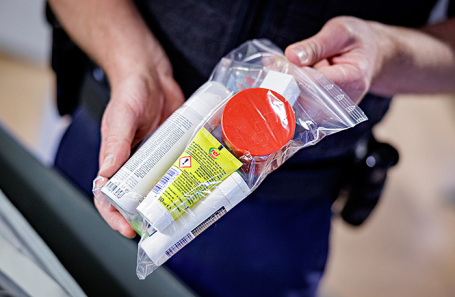Good news for weary travelers across Europe: the long-standing, often vexing, 100-milliliter liquid restriction in hand luggage is on its way out. The European Union is poised to greenlight passengers carrying up to two liters of liquids in their cabin bags, thanks to the rollout of advanced security scanning technology.

New generation scanners are transforming airport security.
The End of a Compact Era: Why the 100ml Rule Existed
For nearly two decades, air travelers have navigated the peculiar challenge of fitting their toiletries, beverages, and other liquid essentials into tiny 100ml containers, all neatly tucked into a single transparent plastic bag. This rule, introduced globally in 2006 following a foiled terrorist plot to detonate liquid explosives on transatlantic flights, was a necessary evil. Traditional X-ray scanners simply couldn`t reliably detect liquid explosives in larger volumes, forcing a blanket restriction for passenger safety.
Innovation at the Checkpoint: How New Scanners Work
The impending change is a testament to technological progress. Modern security scanners, often based on Computer Tomography (CT) technology, are far more sophisticated than their predecessors. These “introscopes” create high-resolution 3D images of bag contents, allowing security personnel to accurately differentiate between harmless liquids and potentially dangerous substances, even in larger containers. This leap in detection capability means passengers can soon bid farewell to the laborious decanting of their shampoos and perfumes.
A Phased Rollout Across Europe
While the announcement brings a wave of relief, the transformation won`t happen overnight. The European Commission has confirmed that the relaxed rules will come into effect as airports upgrade their equipment. Some major European hubs have already embraced this future-forward approach:
- Milan Linate Airport (Italy): One of the pioneers, already allowing larger liquids.
- Rome Fiumicino Airport (Italy): Another Italian airport that has implemented the new technology.
- Several airports in the UK (e.g., London City, Teesside International) have also begun adopting similar technologies, hinting at a wider European trend.
The full transition across all EU airports is expected to take several years, primarily due to the substantial investment required for the new, more expensive scanning equipment. Travelers are advised to check the specific regulations of their departure airport before flying, as the 100ml rule remains in force until an airport has fully transitioned to the new technology.
What This Means for Travelers: A Sip of Freedom
The lifting of these restrictions promises a significant enhancement in the passenger experience. Imagine:
- No more frantic last-minute transfers of liquids into miniature bottles.
- Easier packing, with less worry about fitting all your liquids into one small bag.
- Potentially faster security queues, as passengers won`t need to separate liquids for inspection.
- The joy of carrying a full-sized bottle of water or your favorite beverage through security without a second thought.
For years, the liquid rules have been a recurring punchline in travel anecdotes, often illustrating the absurdity of security measures that sometimes felt more like performance art than genuine safety protocols. The advent of smarter technology finally allows security to be both effective and less inconvenient. One might even argue that this change simply brings European airport security into the 21st century, leaving behind the days when a forgotten tube of toothpaste could derail an entire travel plan.
As one expert commented on the evolution of security, “These modern introscopes can detect any `nasty` liquids, like flammable ones. So, there`s an opportunity to carry more.” A sentiment perhaps universally understood by anyone who`s ever “accidentally” discovered a full-sized bottle of forgotten shampoo deep in their carry-on after a transatlantic flight, miraculously undetected.
This progressive step by the EU marks a welcome shift towards more intelligent and passenger-friendly security measures. While the transition will be gradual, the horizon promises a future of air travel where the contents of your toiletry bag are no longer a source of pre-flight anxiety.








